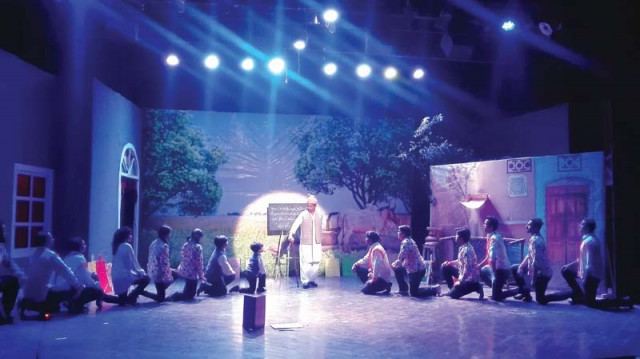Do Duni Char: Using theatre as an instrument for social change
The director stressed the need for bridging the divide between private English-medium schools and public schools

A scene from Do Duni Char being enacted. PHOTO: MARIAM SHAFQAT/EXPRESS
Artists, writers and social workers gathered at Alhamra on The Mall on Wednesday to present Do Duni Char—a play conceived to highlight what plagues public education, especially in extremely backward areas.
Azad Group, a theatre company striving to bring about social change has collaborated with Plan International—an NGO trying to ensure the provision of education and promotion of healthy lifestyles among underprivileged children—on the initiative. In an extremely simple yet convincing manner, the writer of the play Williams Pervez has explored the bevy of challenges that impede provision of education to children. The play manages to address them all-- From poverty to social and political pressures, gender bias, ignorance and governmental inefficiency—in just about one and a half hour.
Director Malik Aslam, who is also the chief executive of Azad Group, told The Express Tribune that the underlying objective of staging the performance was to foster debate regarding Article 25-A of the Constitution. According to the Article, he said, right to education was recognised as one of citizens’ fundamental rights. He said ensuring the provision of free and compulsory education to children aged between five years and 16 was a responsibility of the government, according to the Article. “In Sindh and the Punjab, pertinent legislation has been introduced with regard to the Article but little has been done to ensure its effective implementation, especially in rural areas,” Aslam said.
The director stressed the need for bridging the divide between private English-medium schools and public educational institutions. He said the gulf had left those enrolled across public schools at a clear disadvantage, while emphasising the need for revamping quality standards there. Aslam said one of the chief themes that the play dwelled on was the importance of girls’ education. “We want to convey the message that (merely) introducing legislation is not enough and the Article must be implemented in its full spirit in an entertaining manner,” he said. Aslam said the people ought to be made aware about the existence of the Article to enable them to fight for their right to free and quality education if the need ever arose.
Actor Zohaib Haider, who essayed the negative role of a politician cum feudal lord in the play, said his character spoke volumes about what plagued the provision of quality education nationwide. “Feudal lords in the garb of politicians in every rural area have continued to amass power and exacerbate the situation,” he said. Haider said this ought to be addressed separately to ensure better standard of life across backward areas.
The play will continue to be staged at the venue till February 29.
Published in The Express Tribune, February 25th, 2016.


















COMMENTS
Comments are moderated and generally will be posted if they are on-topic and not abusive.
For more information, please see our Comments FAQ